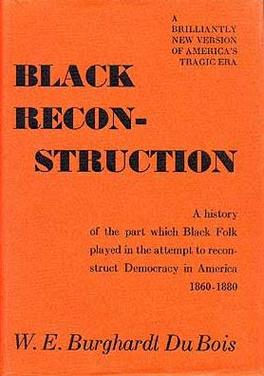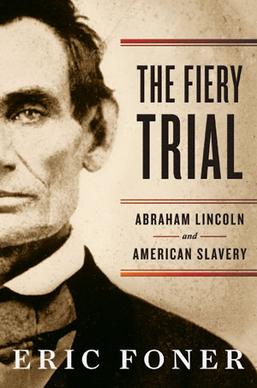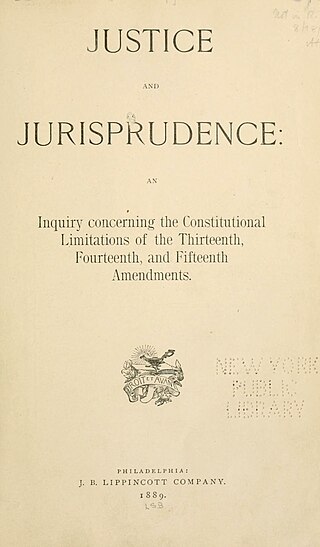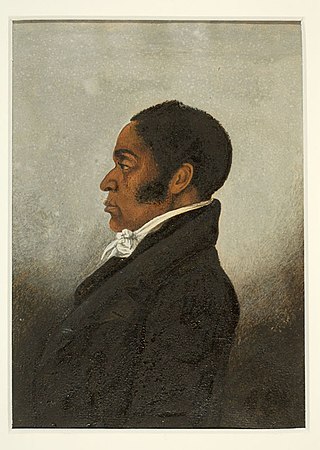
The Thirteenth Amendment to the United States Constitution abolished slavery and involuntary servitude, except as punishment for a crime. The amendment was passed by the Senate on April 8, 1864, by the House of Representatives on January 31, 1865, and ratified by the required 27 of the then 36 states on December 6, 1865, and proclaimed on December 18. It was the first of the three Reconstruction Amendments adopted following the American Civil War.

The Fifteenth Amendment to the United States Constitution prohibits the federal government and each state from denying or abridging a citizen's right to vote "on account of race, color, or previous condition of servitude." It was ratified on February 3, 1870, as the third and last of the Reconstruction Amendments.

The Reconstruction era was a period in United States history following the American Civil War, dominated by the legal, social, and political challenges of abolishing slavery and reintegrating the former Confederate States of America into the United States. During this period, three amendments were added to the United States Constitution to grant equal civil rights to the newly freed slaves. Despite this, former Confederate states often used poll taxes, literacy tests, and intimidation to control people of color.

Thaddeus Stevens was an American politician and lawyer who served as a member of the United States House of Representatives from Pennsylvania, being one of the leaders of the Radical Republican faction of the Republican Party during the 1860s. A fierce opponent of slavery and discrimination against black Americans, Stevens sought to secure their rights during Reconstruction, leading the opposition to U.S. President Andrew Johnson. As chairman of the House Ways and Means Committee during the American Civil War, he played a leading role, focusing his attention on defeating the Confederacy, financing the war with new taxes and borrowing, crushing the power of slave owners, ending slavery, and securing equal rights for the freedmen.

The Civil Rights Act of 1866 was the first United States federal law to define citizenship and affirm that all citizens are equally protected by the law. It was mainly intended, in the wake of the American Civil War, to protect the civil rights of persons of African descent born in or brought to the United States.

Eric Foner is an American historian. He writes extensively on American political history, the history of freedom, the early history of the Republican Party, African American biography, the American Civil War, Reconstruction, and historiography, and has been a member of the faculty at the Columbia University Department of History since 1982. He is the author of several popular textbooks. According to the Open Syllabus Project, Foner is the most frequently cited author on college syllabi for history courses. According to historian Timothy Snyder, Foner is the first to associate the storming of the Capitol on January 6, 2021 with section three of the fourteenth amendment to the constitution.
The Redeemers were a political coalition in the Southern United States during the Reconstruction Era that followed the American Civil War. Redeemers were the Southern wing of the Democratic Party. They sought to regain their political power and enforce White supremacy. Their policy of Redemption was intended to oust the Radical Republicans, a coalition of freedmen, "carpetbaggers", and "scalawags". They were typically led by White yeomen and dominated Southern politics in most areas from the 1870s to 1910.
David Hackett Fischer is University Professor of History Emeritus at Brandeis University. Fischer's major works have covered topics ranging from large macroeconomic and cultural trends to narrative histories of significant events to explorations of historiography.

Black Reconstruction in America: An Essay Toward a History of the Part Which Black Folk Played in the Attempt to Reconstruct Democracy in America, 1860–1880 is a history of the Reconstruction era by W. E. B. Du Bois, first published in 1935. The book challenged the standard academic view of Reconstruction at the time, the Dunning School, which contended that the period was a failure and downplayed the contributions of African Americans. Du Bois instead emphasized the agency of Black people and freed slaves during the Civil War and Reconstruction and framed the period as one that held promise for a worker-ruled democracy to replace a slavery-based plantation economy.
The Dunning School was a historiographical school of thought regarding the Reconstruction period of American history (1865–1877), supporting conservative elements against the Radical Republicans who introduced civil rights in the South. It was named for Columbia University professor William Archibald Dunning, who taught many of its followers.

David William Blight is the Sterling Professor of History, of African American Studies, and of American Studies and Director of the Gilder Lehrman Center for the Study of Slavery, Resistance, and Abolition at Yale University. Previously, Blight was a professor of History at Amherst College, where he taught for 13 years. He has won several awards, including the Bancroft Prize and Frederick Douglass Prize for Race and Reunion: The Civil War in American Memory, and the Pulitzer Prize and Lincoln Prize for Frederick Douglass: Prophet of Freedom. In 2021, he was elected to the American Philosophical Society.

This is a selected bibliography of the main scholarly books and articles of Reconstruction, the period after the American Civil War, 1863–1877.
James Oakes is an American historian, and is a Distinguished Professor of History and Graduate School Humanities Professor at the Graduate Center of the City University of New York where he teaches courses on the American Civil War and Reconstruction, Slavery, the Old South, Abolitionism, and U.S. and World History. He taught previously at Princeton University and Northwestern University.

The presidency of Andrew Johnson began on April 15, 1865, when Andrew Johnson became President of the United States upon the assassination of President Abraham Lincoln, and ended on March 4, 1869. He had been Vice President of the United States for only six weeks when he succeeded to the presidency. The 17th United States president, Johnson was a member of the Democratic Party before the Civil War and had been Lincoln's 1864 running mate on the National Union ticket, which was supported by Republicans and War Democrats. Johnson took office as the Civil War came to a close, and his presidency was dominated by the aftermath of the war. As president, Johnson attempted to build his own party of Southerners and conservative Northerners, but he was unable to unite his supporters into a new party. Republican Ulysses S. Grant succeeded Johnson as president.
The civil rights movement (1865–1896) aimed to eliminate racial discrimination against African Americans, improve their educational and employment opportunities, and establish their electoral power, just after the abolition of slavery in the United States. The period from 1865 to 1895 saw a tremendous change in the fortunes of the Black community following the elimination of slavery in the South.

The Fiery Trial: Abraham Lincoln and American Slavery is a historical non-fiction book written by American historian Eric Foner. Published in 2010 by W. W. Norton & Company, the book serves as a biographical portrait of United States President Abraham Lincoln, discussing the evolution of his stance on slavery in the United States over the course of his life. The Fiery Trial, which derives its title from Lincoln's Annual Message to Congress of December 1, 1862, was the 22nd book written by Foner, the DeWitt Clinton Professor of History at Columbia University. It was praised by critics and won the 2011 Pulitzer Prize for History, the Bancroft Prize, and the Lincoln Prize.

Heather Cox Richardson is an American academic historian, author, and educator. She is a professor of history at Boston College, where she teaches courses on the American Civil War, the Reconstruction Era, the American West, and the Plains Indians. She previously taught history at MIT and the University of Massachusetts Amherst.

Justice and Jurisprudence is a book that was first published in 1889 by the Brotherhood of Liberty. It was a critique of rulings of the Supreme Court of the United States on the Reconstruction Amendments. The book is "the first known comprehensive book on jurisprudence written by blacks" and serves as a valuable source of information on African Americans' legal opinions in the late 19th century.
Reconstruction: America's Unfinished Revolution, 1863-1877 is a historical non-fiction monograph written by American historian Eric Foner. Its broad focus is the Reconstruction Era in the aftermath of the American Civil War, which consists of the social, political, economic, and cultural changes brought about as consequences of the war's outcome. The author addresses, criticizes, and integrates several historical perspectives of the Civil War that first appeared during Reconstruction, such as the reconciliationist, white supremacist, and abolitionist perspectives, into a single cohesive academic narrative based on primary sources, such as newspaper quotations and interviews with Americans who lived through the era, as well as secondary sources, such as other texts written on the subject.

The African American founding fathers of the United States are the African Americans who worked to include the equality of all races as a fundamental principle of the United States. Beginning in the abolition movement of the 19th century, they worked for the abolition of slavery, and also for the abolition of second class status for free blacks. Their goals were temporarily realized in the late 1860s, with the passage of the 13th, 14th, and 15th amendments to the United States Constitution. However, after Reconstruction ended in 1877, the gains were partly lost and an era of Jim Crow gave blacks reduced social, economic and political status. The recovery was achieved in the Civil Rights Movement, especially in the 1950s and 1960s, under the leadership of blacks, such as Martin Luther King and James Bevel, as well as whites that included Supreme Court justices and Presidents. In the 21st century scholars have studied the African American founding fathers in depth.












